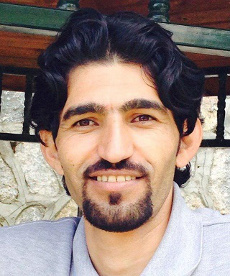Defenders of Human Rights Center: Judiciary Head Larijani Must Step Down
Iran’s Defenders of Human Rights Center has demanded the resignation of the head of the country’s judiciary, Sadegh Amoli Larijani, in protest of the handling of cases of dissidents and political, cultural, and civil society activists. The Defenders hold the top judicial official directly responsible for injustices, corruption, and insecurity across the legal branch and society generally. In a January 4 announcement, the Center calls on fellow citizens, activists, and representatives of the Majles to say “No to the Head of the Judiciary” and demand that Larijani step down. The announcement, addressed to the people of Iran, is signed by DHRC director and Nobel laureate Shirin Ebadi.
Full English translation of the letter is provided by Abdorrahman Boroumand Foundation:
Clause 156 of the constitution of the Islamic Republic defines the judiciary as an “independent power which safeguards the rights of the individual and society, tasked with administering justice.” Regretfully, we’ve seen this institution stray daily from its fundamental duty.
The ruined structure which was passed on from the era of Mohammad Yazdi to Said Mohammad Hashemi Shahroudi, former head of the judiciary, has not only failed to flourish. It has become a circus ring for those who, in the name of religion or on the pretext of security, have gunked up the law like a handkerchief with hypocrisy, flattery, murder, trumped-up prosecutions, and lies. The result of such a trend is that the convict and free person switch places.
The civil and social activists, scholars, and intellectuals who speak a word of criticism earn prison, lengthy sentences, torture, and abuse. Meanwhile criminals, oppressors, embezzlers, and serial killers, safe and sound in this corrupt system, keep busy with conniving and worldly pleasures.
Compassionate lawyers are not only denied the right to defend themselves; should they insist on defending the rights of the people as Abdolfattah Soltani has done, they’re sentenced to lengthy prison terms. Meanwhile judges heedless of matters of justice and injustice like Salavati, Mortazavi, and Moghiseh find secure positions in the judicial system and become trusted friends of the security forces, confident they’ll never have to answer for the rights of the people.
Those who have committed acid attacks rest easy in the safe margins set up for them by the judicial branch, and those who protest acid attacks like Ali Shariati must fight for the right to fair trial with hunger strikes in prison walls.
Social, political, and civil activists who simply ask questions of ruling institutions or express an opinion different than official position are quickly turned over to courts with no respect for their legal rights. Dissident thought, differences in opinion, perspective, and ideology, and even political or religious tastes at odds with the ruling order are considered unpardonable offenses and bring on the harshest sorts of punishment, in such a way that some of the country’s inmates constitute political prisoners and prisoners of conscience.
Must the question not now be asked: where in the world and when in history would such a system be called one of “justice,” “fairness,” and “law?” Has the judicial branch at any time in Iran’s history been the frail, lowly plaything of the intelligence services – the Ministry of Intelligence and the Sepah’s intelligence organization- that it is today?
Of course, it’s been some time that we’ve seen, and continue to see, that citizen groups both small and large strive to register their protest with the public and officials by launching campaigns to support a handful of political prisoners online and in the real world. Or that prisoners themselves, political or otherwise, in light of officials’ neglect of their most ordinary rights and lawlessness in judicial proceedings, often have no choice but to take up hunger strikes – or, as in the case of Said Shirzad, show their protest in more harrowing ways.
Must the question not now be asked: what judiciary official has responded to so many of the people’s demands with a fair, correct, and appropriate answer?
On the grounds that The Defenders of Human Rights Center holds the head of the judiciary directly responsible for all this injustice, corruption, and insecurity in the judicial system and society generally, we proclaim the urgent need for this high official to resign his position and call upon our fellow citizens, including human rights and civil activists, to join us in saying “No To the Head of the Judiciary” and demand the resignation of Sadegh Amol Larijani from the leadership of the judicial system.
The people’s representatives in the Majles are similarly bound before the law, per their Article 76 constitutional prerogative to research and investigate all national affairs, to exercise their supervisory duty over the judicial system and, given all the evidence and living witnesses, press the prosecution of its head.
Even if the Islamic Republic’s constitution vests responsibility for confirming the head of the judiciary in the Supreme Leader – a system which may itself prove troublesome – we know it is our right in the framework of this system to not give up protesting and making demands for justice in the face of so much tyranny and corruption in the judicial system. This it is that step by step, however small they may be, we move forward on the path of our demands for justice. Perhaps a step will be taken toward making the judiciary accountable.
Shirin Ebadi
Director – Defenders of Human Rights Center
January 4, 2017






 My Interrogator Said: You Are An Ass, And Asses Do Not Merit Human Rights
My Interrogator Said: You Are An Ass, And Asses Do Not Merit Human Rights